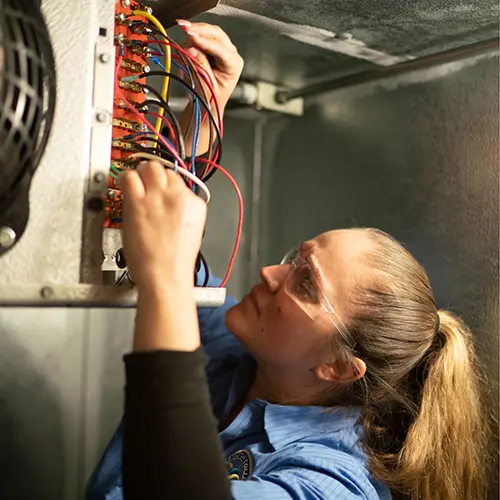HVAC Contractor for Reliable Heating & Cooling Providers
HVAC Contractor for Reliable Heating & Cooling Providers
Blog Article
An In-Depth Check Out HVAC Solutions and Their Impact on Energy Efficiency and Expense Savings
The duty of HVAC services in boosting power efficiency and accomplishing expense financial savings is more vital than ever before, as organizations and property owners look for lasting remedies in an increasingly eco-conscious world. With technological improvements like wise thermostats and high-efficiency parts, the potential for optimizing system performance is large. Yet, the real impact of these advancements depends mostly on regular upkeep and aggressive problem management. As we discover the complex connection in between a/c systems and functional expenses, including the change in the direction of eco-friendly alternatives, the question occurs: how can these strategies be efficiently executed to make best use of both financial and eco-friendly advantages?

Importance of Heating And Cooling Systems
cooling and heating systems are an important element of modern-day buildings, playing an essential function in preserving healthy and balanced and comfy interior settings. These systems, encompassing air flow, heating, and air conditioning, are crucial for managing temperature level, moisture, and air top quality, consequently making certain the wellness of occupants. Effective heating and cooling systems add substantially to producing an optimum indoor environment, which is critical for both business and domestic areas.
In commercial structures, cooling and heating systems are indispensable to providing a effective and risk-free setting. By managing interior environment conditions, these systems help protect against the growth of mold and the spread of air-borne impurities, thus guarding the health of clients and workers. Furthermore, in residential settings, cooling and heating systems improve living conditions by using regular thermal comfort and improving indoor air high quality, which is crucial for total health.
Additionally, the layout and upkeep of HVAC systems have a direct influence on power consumption and operational costs. Properly developed and preserved systems can significantly decrease energy usage, resulting in minimized energy bills and a smaller carbon footprint. The effectiveness of these systems therefore plays a critical role in promoting sustainability and energy conservation within structures, highlighting their relevance in the contemporary architectural landscape.
Breakthroughs in Heating And Cooling Modern Technology
Technology in cooling and heating innovation is reinventing the means structures manage indoor climates, ushering in a brand-new era of effectiveness and control. Current improvements have concentrated on optimizing power intake while enhancing individual convenience. One significant growth is the integration of wise thermostats, which use synthetic intelligence to find out tenancy patterns and change temperature levels accordingly, decreasing unnecessary power use.
Variable Refrigerant Circulation (VRF) systems represent another significant leap ahead. These systems enable accurate temperature level control in different areas of a building, enhancing convenience and minimizing power waste. VRF innovation is particularly useful for big business rooms, providing adaptability and scalability.
Furthermore, the development of Net of Points (IoT) tools has actually transformed HVAC systems right into interconnected networks qualified of real-time information collection and evaluation. This connection enables anticipating upkeep, making sure systems run at peak effectiveness and minimizing unexpected downtime.
In addition, advancements in materials and style, such as the use of high-efficiency coils and compressors, have actually enhanced overall system efficiency - Heating Contractor. The fostering of eco friendly refrigerants likewise underscores the sector's dedication to sustainability
These technical technologies are pivotal in decreasing functional costs and environmental influence, setting brand-new criteria for constructing climate monitoring.
Heating And Cooling Upkeep and Effectiveness
Guaranteeing optimal efficiency of HVAC systems prolongs beyond technical improvements; it additionally pivots on effective maintenance techniques. Normal upkeep is vital for sustaining efficiency, lowering energy usage, and expanding the life span of heating and cooling systems. The key objective is to ensure that all parts function at their peak potential, thus reducing energy wastage and keeping constant interior convenience degrees.
Routine upkeep jobs, such as cleaning or replacing air filters, inspecting refrigerant levels, and evaluating ductwork for leakages, are essential for protecting against unnecessary stress on the system. Dirty or clogged filters can obstruct airflow, causing the system to work more challenging and take in more energy. Likewise, inadequate refrigerant levels can minimize cooling down performance, causing greater functional prices.
In addition, routine evaluations by qualified professionals can determine potential concerns before they rise into expensive repairs or system failings. These inspections frequently include inspecting electric connections, adjusting thermostats, and guaranteeing the general integrity of the cooling and heating system. By addressing minor problems early, companies and homeowners can prevent unanticipated breakdowns and enhance energy performance.
Cost-efficient HVAC Solutions
For those looking to obtain one of the most out of their air, heating, and air flow conditioning systems without breaking the financial institution, exploring economical heating and cooling services can make a significant distinction. One instant step is to purchase programmable thermostats, which allow customers to set specific temperatures for different times of the day, maximizing energy use and lowering look at this site unneeded intake. By automating temperature adjustments, property owners can achieve substantial savings on energy bills.
Normal upkeep is another critical element of economical a/c monitoring. Making certain that filters are cleaned or changed frequently, ductwork is secured, and systems are serviced by professionals can protect against costly repair work and enhance system durability. Precautionary maintenance not just maintains system effectiveness but likewise aids in staying clear of unforeseen breakdowns that can lead to costly emergency fixings.
Additionally, retrofitting existing systems with energy-efficient components, such as Our site variable rate electric motors or high-efficiency compressors, can be a sensible financial investment. These upgrades enhance functional efficiency, minimize energy usage, and can usually be executed at a portion of the expense of a complete system replacement.
Ecological Effect Decrease
Minimizing the ecological effect of HVAC systems is important in today's pursuit of lasting living. HVAC systems are substantial contributors to power intake, representing virtually 40% of power use in industrial structures. This energy need often relies upon fossil fuels, causing greenhouse gas emissions and ecological destruction. Transitioning to much more efficient systems, such as those using eco-friendly energy sources, can considerably mitigate these impacts.
Technological improvements in heating and cooling layout and procedure, including the integration of wise thermostats and energy-efficient warm pumps, are essential in minimizing carbon footprints. These developments enable maximized power use, minimizing wastage and boosting general system performance. In addition, embracing routine maintenance techniques makes certain cooling and heating systems run at peak effectiveness, additional reducing unnecessary power consumption.
Furthermore, the use of environmentally friendly cooling agents is critical, as traditional refrigerants, like CFCs and HCFCs, have been phased out as a result of their ozone-depleting buildings. Modern alternatives, such as hydrofluoroolefins (HFOs), offer minimized ecological dangers, lining up with worldwide ecological procedures. By welcoming these sustainable techniques, cooling and heating services can play a transformative duty in minimizing environmental effects, advertising energy performance, and promoting he said an extra sustainable future.
Final Thought

In addition, the layout and maintenance of Heating and cooling systems have a direct effect on power intake and operational costs. Routine upkeep is crucial for sustaining effectiveness, decreasing energy intake, and extending the life period of Cooling and heating systems. Heating and cooling systems are substantial factors to energy consumption, accounting for almost 40% of power usage in commercial structures. Furthermore, embracing regular maintenance practices guarantees HVAC systems operate at peak effectiveness, further cutting unnecessary energy consumption.
The transition to environmentally pleasant Cooling and heating systems further reduces functional prices and advertises sustainability. (Heating Contractor)
Report this page